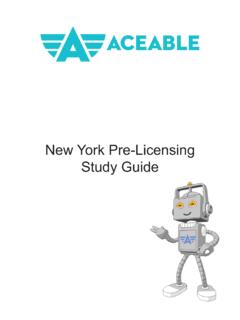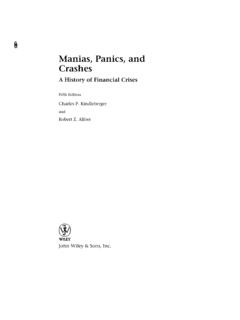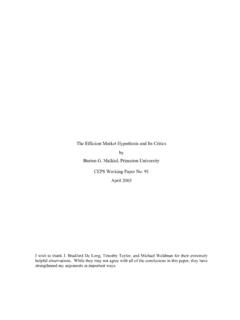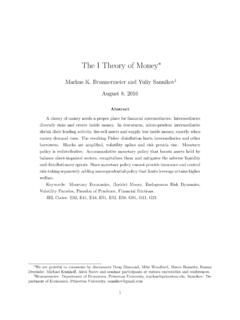Transcription of Real Estate Finance Key Terms
1 Real Estate Finance Key Terms Level 1: The Nature and Cycle of Chapter 3. Collateral - something of value that is pledged to a Real Estate Finance lender as a promise to repay a loan Leverage - the use of a relatively small amount of Chapter 2 money in order to get a much bigger loan for Pre-Qualification - the first step in determining purchasing real Estate how much house the buyer can afford and which Primary Market - market in which mortgages are type of loan might be best; the buyer supplies infor- first created by connecting lenders to borrowers mation about their financial situation to the lender, Secondary Market - market in which loans and who then provides a general estimate servicing rights are sold to investors Pre-Approval - official process of being approved by Sales Comparison Approach - property valuation a lender to borrow a specific amount at an interest method that determines value by comparing the rate within a small range.
2 A mortgage application, subject property to the sales prices of similar credit report, and supporting financial documenta- properties that have sold recently tion are required Cost Approach - method of estimating the value of a Mortgage Broker - someone who brings together a property by determining how much it would cost to borrower and a lender in order to create a mortgage completely replace it and then subtracting from that Mortgage Banker - an entity or person who provides value to account for depreciation mortgage financing by using their own funds Income Approach - method of estimating the value Correspondent Lender - a lender who offers loans of a property based on the amount of income it
3 Could using their own money at their own risk, generally on produce for its owner a smaller scale than mortgage brokers and bankers Conforming Loan - a loan that has been made Origination - the creation of a new mortgage according to the guidelines that will allow the loan to Loan Processing - when the lender collects informa- be sold on the secondary market tion and application from the buyer to help determine Non-Conforming Loan - a loan that does not meet the loan type and amount they will qualify for the guidelines to be sold on the secondary market Underwriting - the process of deciding the level of Mortgage Insurance Premium (MIP)
4 - required risk a lender would take on by offering a loan to a insurance to protect the lender in the event of certain borrower for a specific property borrower default on an FHA loan Closing - the consummation of a real Estate transac- Private Mortgage Insurance (PMI) - insurance that tion when all the necessary contracts are signed and protects the lender in the event of borrower default the lender disburses the funds of the mortgage loan on a conventional loan Funding - the transferring of funds by the lender to a title company or escrow company so that they may be disbursed Chapter 4. Servicing - the ongoing collection of monthly pay- Recovery - the economic phase in which conditions ments and maintenance of records by a loan servicer stabilize after a recession and the outlook for the market starts to look brighter Expansion - the economic phase in which market activity really picks up (businesses start hiring again, Monetary Policy - a term used to refer to the actions people are investing in real Estate ) of central banks to achieve big, macroeconomic Hyper Supply - the economic phase in which supply policy objectives catches up with (and then surpasses)
5 Demand Recession - a period in which economic activity drastically declines and stays declined for more than Chapter 2. six months Federal Open Market Committee (FOMC) - the Economic Bubble - forms when the value of something Federal Reserve's policy-making body, which is (typically real Estate or stocks) grows so much that its charged with overseeing the federal government's market value is higher than its actual value open market operations Housing Affordability Index - compares median Open Market Operations - adjustments to the supply household income to the income needed to purchase of money implemented by the Federal Reserve to a median-priced home influence the interest rate Inflation - a general rise in prices as the result of a Discount Rate - the interest rate at which the Fed decrease in the dollar's purchasing power lends money to its member banks The Reserve Requirement - requirement that all
6 Depository institutions (not just member banks) keep Chapter 5 a certain percentage of their funds in the regional Market - a theoretical construct that isolates the selling Reserve bank and purchasing of any one particular commodity from Securities - any financial asset that can be traded, the economy as a whole including futures, stocks, mortgage loans, and options Demand - consumers' ability and willingness to buy a good or service at a certain price Supply - an amount of a commodity that is available Chapter 3. based on the willingness and ability of sellers in a Money Laundering - financial transaction in which given market to sell that commodity criminals, including terrorist organizations, attempt to disguise the proceeds, sources, or nature of their illicit activities by funneling the money through otherwise legitimate business transactions Level 3: Money and the Monetary Shell Companies - companies that don't have any real operation, but exist as vehicles for business System transactions Chapter 1.
7 Legal Tender - United States coins and currency Chapter 4. good for all debts, public charges, taxes, and dues 1933 Banking Act - depression-era federal act that Federal Reserve Act - the 1913 act that created the created the Federal Deposit Insurance Corporation Federal Reserve Federal Deposit Insurance Corporation (FDIC) - The Federal Reserve - centralized United States bank independent agency that provides deposit insurance created to conduct monetary policy and stabilize the to depositors in banks economy Glass-Steagall Act - part of the 1933 Banking Act that prevents investment banks from taking deposits and Association.
8 A corporation that promotes preventing commercial Federal Reserve members homeownership banks from various risky behaviors Dodd-Frank - Federal Act passed as a result of the housing bubble and financial crisis that resulted in Chapter 2. the most significant financial reforms to the American Community Reinvestment Act (CRA) - helps banking system since the post-Great Depression commercial banks and savings associations meet legislation the needs of borrowers in all segments of their communities, including low- and moderate-income neighborhoods Chapter 5 Truth in Lending Act (TILA) - educates and protects Federal Home Loan Bank Act of 1932 - extended consumers against inaccurate and unfair credit billing $125 million in credit to savings and loan institutions and credit card practices by requiring lenders to stan- and created the Federal Home Loan Bank System, dardize the way costs associated with borrowing are setting up the 12 regional banks calculated and disclosed Community Investment Program (CIP)
9 - program Regulation Z - under TILA, prohibits specific acts operated by each FHLBank that offers below market and practices in connection with an extension of rate loans to members for long-term financing for credit secured by a consumer's dwelling housing and economic development that benefits low APR - Annual Percentage Rate, a numeric and moderate-income families and neighborhoods representation of an interest rate Regulation M - prevents manipulation by individuals with an interest in the outcome of an offering, and prohibits activities and conduct that could artificially Level 4: Additional Government influence the market for an offered security Influence Dodd-Frank Act - the Dodd-Frank Wall Street Reform and Consumer Protection Act Chapter 1 Volcker Rule - Federal regulation prohibiting banks HUD - The Department of Housing and Urban from conducting certain investment activities with Development their own accounts, also limits their ownership of Real Estate Settlement Procedures Act (RESPA)
10 - and relationship with hedge funds and private equity an act designed to protect consumers from predatory funds, also called covered funds lending and educate them about closing and settle- CFPB - Consumer Financial Protection Bureau; works ment services to protect consumers from unfair, deceptive, and LDP - Limited Denial of Participation abusive practices FHA - Federal Housing Administration SAFE Act - the Safe Mortgage Licensing Act; sets Public Housing - housing provided for people with a minimum standard for licensing and registering low incomes, subsidized by public funds mortgage loan originators Subsidized Housing - government sponsored Administrative Procedure Act - governs the way economic assistance programs aimed at alleviating administrative agencies of the federal government housing costs and expenses for people with low to may propose and establish regulations moderate incomes IRS - Internal Revenue Service.













